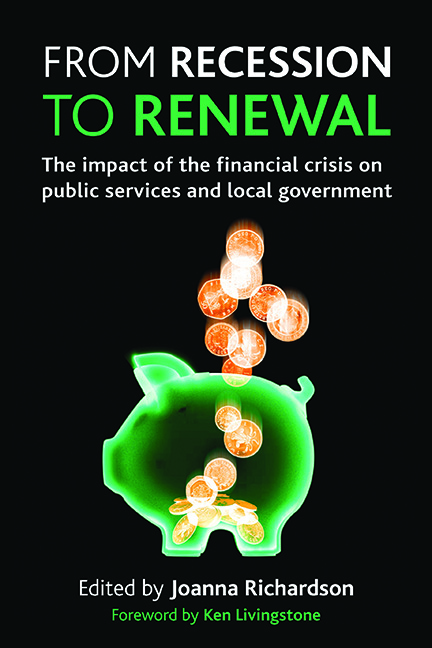 From Recession to Renewal
From Recession to Renewal two - The historical context of the global financial crisis: from Bretton Woods to the debacle of neoliberalism
Published online by Cambridge University Press: 01 September 2022
Summary
The global financial crisis, which began in 2007 and was temporarily contained in 2009 by national-level government interventions, still holds deep and worrying implications for the future. As nations have accrued huge deficits to prop up transnational financial institutions, the problems remain of large amounts of overvalued assets on banks’ balance sheets, and unknown liabilities in off-balance-sheet vehicles. However, most significant and immediate for the theme addressed in this book is the British government's decision to maintain and increase spending in response to the crisis. This has led to an unprecedented peace-time budget deficit that now necessitates both cuts in public spending and increases in taxation, against a background of rising unemployment and sharply falling tax revenues. The root of this quandary, at the international and UK levels, lies not just in the mismanagement of the international monetary system by banks and governments, but in globalisation itself; a process in which a significant proportion of the power once held by nation-states has been ceded to transnational business (Strange, 1997).
The aim of this chapter is to provide a background to the current crisis of public finances in the UK by tracing the historical developments which have resulted in a transfer of power by states to global forces. The starting point for this analysis is the Bretton Woods conference of 1944 when the wartime Allies, led by the United States and Britain, met to establish a financially regulated order of nation-states which would contain the excesses of free capital movements. A study will follow of those actors, principally private international financial interests and emerging multinational corporations, that sought to undermine this order and replace it with a deregulated global market. Although leaders in some states attempted to resist this process, others, like Margaret Thatcher in Britain and Ronald Reagan in the US, became champions of the new ‘private’ global system. Interventions by these neoliberal politicians, who in turn were influenced by academics and intellectuals who gave theoretical justifications to such notions as the ‘efficient market hypothesis’, consolidated the belief that the state’s role was to facilitate the transnationalisation of market forces, rather than to seek to manage capitalism on behalf of the nation.
- Type
- Chapter
- Information
- From Recession to RenewalThe Impact of the Financial Crisis on Public Services and Local Government, pp. 25 - 50Publisher: Bristol University PressPrint publication year: 2010
